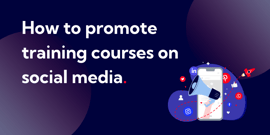The Ultimate Guide To Increasing Online Course Bookings

Introduction
Increasing your online course bookings in the modern world is difficult.
With competition more fierce than ever before, you need to use all the tools in your arsenal just to remain competitive. Below, we explore the things you need to master to give your business the best possible chance to rise above the noise and get noticed by potential clients.
Optimise Your Website
The first place to start has to be your website.
The best training business websites out there are visually appealing, easy to navigate, have clear messaging and are authoritative. You have to think of yourself as both an online retailer as well as a training company, and this must be instantly obvious for potential clients that visit your site.
Then, translate the hits into business by adopting online course booking, giving customers the option to book there and then!
Make your website engaging and informative. It’s all about content....
Does your website showcase the value of what you do? Make sure it contains testimonials from previous clients and solid evidence that your work provides a return on investment. Use case studies to explain how you helped a major retailer boost sales during the recession by rolling out an extensive customer service training programme or improved employee retention in a call centre experiencing high levels staff turnover.
It is also important to include concise information about the topics covered by your courses and how they can be formatted for online or classroom-based learners.
Consider Online Booking
Course booking software is essential as it offers 24/7 sales access to your course information. Online booking also allows you to translate hits to your website into solid business deals. Use it to capture the business of browsers by allowing them to book a course there and then while the need is still in the front of the visitors mind.
Don’t lose business by restricting booking options to telephone or form filling. Make sure that you offer an online payment portal so that you can accept a wide variety of payment types instantaneously, including the Worldpay, Paypal and Sagepay.
Content Marketing & SEO
Content marketing involves the creation and sharing of digital material such as videos, blogs and podcasts in order to:
- Educate potential clients on your offering
- Share industry knowledge
- Increase traffic to your website
Search Engine Optimisation (SEO) is the process of increasing both the quantity and quality website traffic through high website page rankings on Google, Bing and other search engines.
Together, content marketing and SEO allows your training business to create content that will allow you to match the keywords your potential clients are searching for.
If you offer Health and Safety training courses in Reading, some useful keywords to target could include things like:
- health and safety training reading
- first aid at work course reading
- first aid training provider reading
Now it's time to get out the pen and paper, and open up Google Keyword Planner. The aim of this tool is to help you choose the right keywords for your business. A couple of things you'll find using this tool (and things to avoid) include:
- Being too specific: "first aid at work course 29th june reading" is obviously not a useful keyword string to target. Not only is it time-sensitive (you'd have to update this daily) but it also is probably never searched for ever. It makes no sense to target this because whether you rank 1st or 100th it will not change your website traffic.
- Being too broad: Sorry to break this news, but if you're hoping to rank for "training company" you may find yourself a little disappointed. Even if you did manage to get some web traffic from this, how likely is it the searcher is looking for your particular offering?
You may find with all the different keyword combinations of course offerings, locations and demographics that you target that you end up with a list of 100+ keywords.
Once you have your list of keywords, you want to use a tool that helps you to track the relative position of these keywords. Here at accessplanit, we use SEMrush, however there are loads more options available.
Regularly update your website with blogs and news articles and post links to these on social media channels. This will increase the numbers of people visiting the website, which will also rank higher on Google if new posts are added on a regular basis.
The beauty of social media sites is that it allows trainers to share content with the relevant audiences and build streams of traffic back to your site. Remember to promote your site as an authoritative source of information and avoid using social media alone to hard sell your products and services.
When we talk about ‘content’ in the marketing sense, we refer to the production of thought-leadership articles, blogs, eBooks, in-depth reports, infographics – the list goes on! The production of content is all about increasing your visibility to your target audience.
Whatever way it is that you want to position yourself as a business, content is the way to do it. Whether you want to be seen as the fun Aunt of training providers or the expert in your field this needs to be reflected in your content from the wording to the branding.
Top tip: share your content! Ensure that people are finding and looking at what you are producing. This can be done in many ways including joining and contributing to social media groups, posting your content on blog sharing sites such as StumbleUpon and sending out content in email campaigns.
To learn more about producing and sharing content download free ‘Why is content so important for training companies?’ whitepaper.
SEO & PPC
At Everest Conference 2018, Richard Metcalfe and Adam Barwise representing Fat Media gave us an insight into the current trends surrounding SEO (Search Engine Optimisation) and PPC (Pay-Per-Click), with a case study on the Distance Learning Centre. The talk began with an overview of SEO aimed at those in the audience unfamiliar with the term. Fat Media accurately described SEO as “...how google ranks your website and how you show up in the search engine results page”.
Here are some key ways you can improve your online performance and increase your sales leads. Read on to discover:
- How to use longtail keywords to improve your search engine performance
- Implementing small changes to make a huge impact on your overall online presence
- The factors that influence how well your Pay-Per-Click ads rank
Content is King
The evolution of SEO over the years was touched on briefly, mainly the shift away from black hat techniques like keyword stuffing which have subsequently been penalised by Google in its algorithm updates in order to encourage more organic page ranking. The popular phrase 'Content is King' was the rhetoric repeated by Fat Media, with relevant and original content highlighted as the foundation of successful SEO.
A focus on keywords and longtail keyword phrases has become paramount for any SEO campaign. Longtail phrases being keywords consisting of 2+ words as oppose to the just single keywords. “Longer tail are easier to achieve rankings with because there is less competition”, said Metcalfe.

This is important when carrying out keyword research because the most desirable words (and phrases) are those that are included in a high number of searches but have lower competition. This means you are less likely to have to compete with other sites to rank highly for these keywords.
The speakers provided a holistic overview of the technical aspects of SEO, delving into specifics like 301 redirects for error pages, the importance of internal linking and making SEO friendly changes to titles and descriptions. All small components individually, but when implemented as part of wider SEO campaign can be extremely effective in ensuring your page ranks as highly as possible.
“Links to your site are very important, so it’s a case of going through and trying to build links from suppliers, newspapers, anything relevant to your business”.
Relevant links present in your content are something that Google’s optimisation algorithms are looking out for and getting backlinks from other sites to your page is of extremely high value. “A link back to the site can really improve referral traffic and the relevance of your website”, said Barwise.

It’s also important to have consistently updated content areas present on your website, such as blogs, knowledge bases and advice centres. What this does is provide evidence that your company has extensive knowledge of its product and its field while being up to date with recent changes in the industry.
Paid Search
Paid search describes advertising within sponsored listings of a search engine and is a key component to any successful SEO campaign. By paying for an ad you can shortcut organic rankings and bid for particular words and phrases that have a high level of competition. This puts you in pole position to receive clicks relevant to your company’s services directly.

Each advert also has its own ‘Quality Score’, which is calculated by:
- The relevance the landing page has to the advert
- The quality of that landing page
- The historical performance of the holding account
- Successful click through rates
Be sure to consider all of these aspects in order to optimise your PPC ads.
The Distance Learning Centre Case Study
The representatives from Fat Media concluded their presentation with a case study on a virtual college for higher education courses, the Distance Learning Centre. Barwise described the state of their SEO campaign before they were bought on board and how the company was struggling with SEO due to a penalty arising from a new update in Google's algorithm.

“They got penalised really badly because the client had duplicated a lot of the content on their website from other course materials”. Infractions such as this one are penalised because it tells Google that the content has been copied and pasted from elsewhere. Originality is something that has been encouraged massively since these changes, making content creators rightly more inclined to write new and authentic copy.
Fat Media recognised the black hat techniques the client was being penalised for and corrected the issues to align the Distance Learning Centre’s SEO campaign with best practices to achieve success.
"Overall traffic is up 27%, organic traffic from the search engines are up 36% and goal completions are up 66%."
Fat Media helped create an effective SEO campaign that improved keyword ranking, corrected technical aspects such as meta-data and URL structure and combined a content marketing strategy using infographics to accurately target the right customers.
Paying attention to key SEO areas the team were able to turn fortunes around for the Distance Learning Centre in relation to their online presence, increasing brand awareness and bringing in new potential customers.
How to use these tips to improve your overall SEO performance:
- Write original, relevant and evergreen content
- Use keywords and long-tail phrases as a way to attract the right customers
- Place keywords in titles, meta-descriptions and headings where possible
- Build a library of internal and external links to demonstrate authority in your field
- Use simple URLs that are easy to read and understand
Watch Making the Most of SEO and PPC Delivered at Everest Conference 2018
Download the Beginners Guide to Content Marketing for Training Companies to learn more about using inbound marketing in your training organisation
Discount and Promotions
Everybody loves a bargain and the world of training is no exception. This technique can be used to entice both new and existing customers. For example, offer a first time purchase deal as well as welcome back offers. Early bird discounts also work well when wanting to fill a course date in advance. On the other hand, a ‘last few places’ pitch can work equally as well.
Top tip: setting a time limit in which a discount code or offer can be used creates a sense of urgency adding additional ammo to your offer.
Find out how to Use Online Course Booking Systems To Simplify Discounts
Communication
All good training websites will contain information about how visitors can find out more about the structure and cost of specific courses. Some customers will want the opportunity to discuss how your courses can be tailored to suit their business requirements. It is therefore important to provide a contact telephone number or email to allow potential customers to ask specific questions.
Also showcase your company credentials as a training provider by ensuring your website contains full biographies of your team outlining skills, specialisms and experience.


